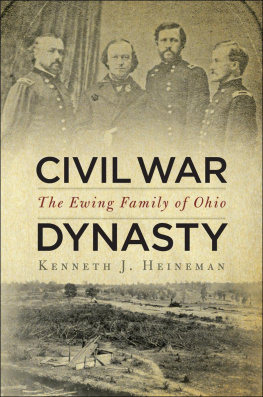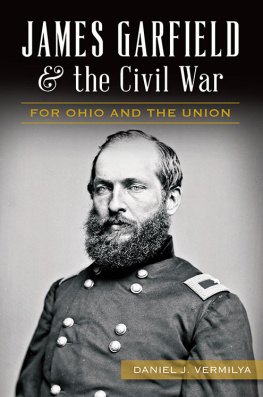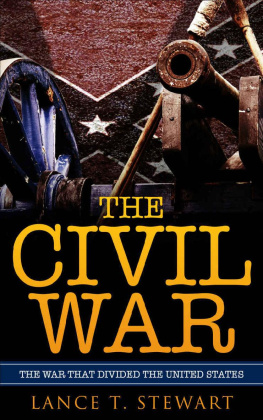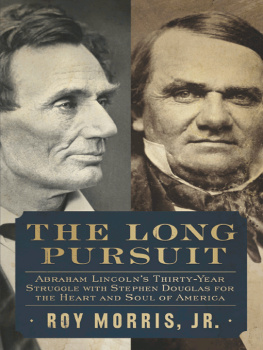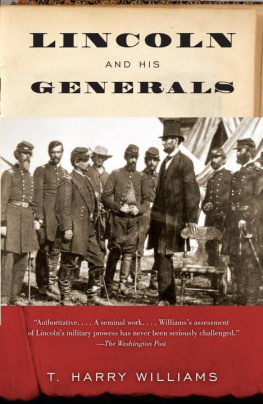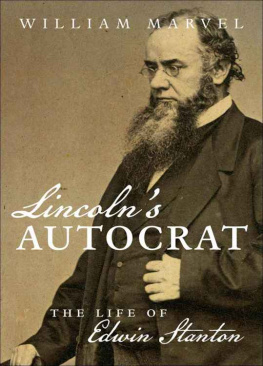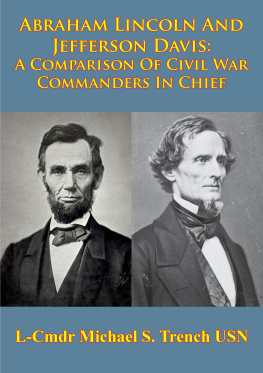2003 by The Kent State University Press, Kent, Ohio 44242
All rights reserved.
Library of Congress Catalog Card Number 2003008139
ISBN 0-87338-766-X
Manufactured in the United States of America
07 06 05 04 03 5 4 3 2 1
LIBRARY OF CONGRESS CATALOGING-IN-PUBLICATION DATA
Lash, Jeffrey N. (Jeffrey Norman), 1949
A politician turned general : the Civil War career of
Stephen Augustus Hurlbut / Jeffrey N. Lash
p. cm.
Includes bibiliographical references and index.
ISBN 0-87338-766-X
1. Hurlbut, Stephen Augustus, 18151882. 2. GeneralsUnited StatesBiography. 3. United States. ArmyBiography. 4. Southwest, OldHistoryCivil War, 18611865Campaigns. 5. United StatesHistoryCivil War, 18611865Campaigns. 6. PoliticiansIllinoisBiography. 7. Republican Party (Ill.)Biography. 8. IllinoisPolitics and government19th century. 9. Charleston (S.C.)Biography. I. Title.
E467.1.H95L37 2003
973.73092dc21
2003008139
British Library Cataloging-in-Publication data are available.


This study is a comprehensive narrative account and an intensive critical examination of both the turbulent early political career and the subsequent and controversial record of the military, political, and diplomatic service rendered by Stephen Augustus Hurlbut, an Illinois Whig and Republican politician, lawyer, and orator who rose to distinction as a prominent member of the Union high command in the West during the Civil War. Specifically, it is a biographical study of a military politician who also served in the Union army as a political general by an appointment from President Abraham Lincoln. This deliberately proposed distinction is significant, even crucial, because difficult conceptual and semantic problems otherwise complicate the historical treatment and assessment of the Northern (and the fewer Southern) soldier-politicians and political generals who exercised command in the Civil War. In logic, these terms are largely misnomers, yet scholars have used them interchangeably to describe two altogether different creatures of the Civil War period. Ulysses S. Grant in particular has accordingly been characterized as a soldier-president during his two terms as chief executive, but one of his political biographers has clearly and convincingly portrayed Grant as essentially a soldier who occupied the White House and nowise a politician.
Many similar examples of this ambiguity abound in studies of Nathaniel P. Banks and Benjamin F. Butler. Their careful biographers have indisputably demonstrated, however, that even in wartime both Banks and Butler functioned basically as party politicians and not as army officers.later, a Union army general. Obviously, he cannot be classified as a soldier who happened to possess an inherently political nature and inclination, and who moreover harbored a vaulting partisan ambition. Rather, Hurlbut should be viewed and treated fundamentally as a militarily inclined party politician.
Beyond clarifying such admittedly arbitrary and yet conceptually and analytically useful interpretative terms, the present book proposes to chronicle and examine the remarkable Civil War career of one of Abraham Lincolns political generals, as well as the antebellum and postbellum stages of that career. Lincoln, in bestowing military patronage upon the influential Republican Banks and the War Democrat Butler so as to mobilize increased support for the Northern war effort in the East, alike conferred high rank upon seemingly deserving Republican and War Democratic politicians hailing from his home state of Illinois. Yet until recently scholars have attached a comparatively smaller importance to the several prominent western political generalsthat is, to such military figures as John A. McClernand, Benjamin M. Prentiss, John A. Logan, Richard J. Oglesby, William H. L. Wallace, and Stephen A. Hurlbut. Overall, however, this study will necessarily concentrate on the unfavorable consequences of Lincolns appointment of Hurlbut to high military rank.
As a matter related to my interpretative approach, I will emphasize and explore two comprehensive themes that, I believe, can explain why Hurlbut succeeded for so long and then, perhaps inevitably, finally failed as a volunteer officer. I shall also identify the motives that actuated his official misconduct as a corps commander at Memphis and as an acting departmental and army commander at New Orleans, and seek to evaluate his highly erratic and unstable personal behavior, particularly in the context of his chronic heavy drinkingif not alcoholism.
Regarding Hurlbuts abuse of alcohol, it should be strongly emphasized that numerous general officers in both the Union and Confederate armies imbibed as freely as did Hurlbut, perhaps even more immoderately. Stephen A. Hurlbut, Gordon Granger, Joseph Hooker, and Lorenzo Thomas within the Union army, and Earl Van Dorn, George Bibb Crittenden, and William Henry Carroll in the Confederate army, to identify but a few officers, earned reputations as heavy drinkers during the war. For instance, in October 1863 the Reverend Samuel W. Fiske, a captain in the 14th Connecticut Volunteers (who under the pseudonym of Dunn Browne contributed to the widely distributed Springfield [Massachusetts] Republican), explained this sorry situation, to his own satisfaction at least, in an article that his editor aptly titled, Whisky in the Army.
The Union armys commissariat probably aggravated the problem of habitual intemperance among Northern general officers. The Union armys commissariat
Nevertheless, whatever the contribution of the commissariats policy to Hurlbuts heavy drinking, and however common among other Union generals, the effects of his imbibingmuch of it on duty and even amid active campaigning in Missouri and West Tennesseeupon his capacity for command were adverse. Finally, it should be understood that most competent medical authorities agree that alcoholism, whatever its physical or psychological origins, is a disease. Thus, Hurlbuts drinking, at least to some extent, can be regarded as a self-destructive habit or pathological addiction and not willful overindulgence.
The paramount theme of this book is Hurlbuts loyal membership in what was to coalesce into an Illinois Clique of Republican politicians. Hurlbuts adherence to Lincoln, Grant, and other members of that group constituted the durable basis of his prolonged, albeit checkered, public career. The Illinois Clique, formed in the antebellum period, originally comprised erstwhile Whig and Democratic politicians (except for Grant, a soldier subsequently brought into the sets inner circle) turned Republicans. Their alliance was not founded on any absolute or uniform philosophical compatibility on such vexed sectional issues as slavery in the western territories or the constitutionality of a states right to secede from the Union. Rather, these men joined together to assert a common political commitment to antislavery goals, demonstrate their partisan solidarity in the interests of state and national Republican victory over the Democratic slave power, and gratify individual greed for party spoils across Illinois and in Washington. Wracked by bitter and incessant dissension over the postwar questions of military reconstruction and urgently needed civil service reform, this group began to disintegrate after the Liberal Republican revolt against President Grant in 1872. While it lasted, this strongly unified and highly self-conscious phalanx of immigrants (mostly born in New England and the upper South) to Illinois attracted, besides Hurlbut, such prominent Illinois Republicans as Abraham Lincoln, Orville H. Browning, Lyman Trumbull, Elihu B. Washburne, Richard Yates, Richard J. Oglesby, Joseph Russell Jones, Joseph Medill, John M. Palmer, David Davis, John A. Logan, and ultimately Ulysses S. Grant.


